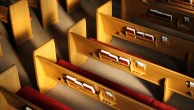Views of Gay Men, Lesbians
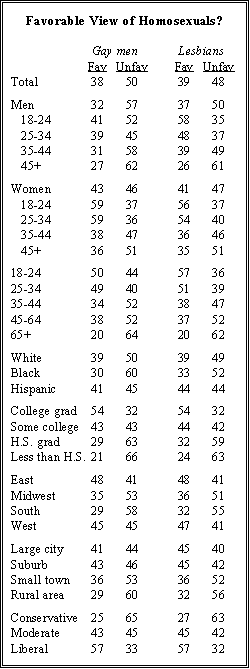
Roughly half of the public expresses an unfavorable opinion of gay men (50% unfavorable) and lesbians (48% unfavorable). Nearly one-in-three (29%) have a very unfavorable opinion of gay men, and 26% have a very unfavorable opinion of lesbians.
In general, young people have more favorable views of homosexuals than do older people. Half of those under age 25 have a favorable view of gay men (50% favorable to 44% unfavorable) and a majority have a favorable view of lesbians (57% favorable, 37% unfavorable). Women tend to express more favorable opinions of both gay men and lesbians, and this is especially true among very young people. Among men age 18-24, opinions about gay men are far more negative (52% unfavorable) than about lesbians (35% unfavorable).
Majorities of college graduates hold favorable views of both gay men and lesbians (54% each), while opinions of those with less education are considerably more negative. There also are regional differences in attitudes toward homosexuals, with people in the East and West expressing the most positive views of gay men and lesbians. And there is a significant difference between urban and rural areas of the country, with unfavorable views much more intense in the latter. Four-in-ten people living in rural areas say they have a very unfavorable opinion of gay men, twice as many as among residents of large cities.
Seculars’ Positive Opinions of Gays
In no major religious group does a majority express favorable views of gay men or lesbians. By comparison, six-in-ten seculars those who say they have no religious affiliation and rarely, if ever, attend religious services hold positive views of homosexuals. (The survey contained too few Jews for a reliable estimate).
Among white mainline Protestants and Catholics, opinion is divided: 43% of mainline Protestants and 46% of Catholics have a favorable opinion of gay men; their views of lesbians are comparable.
White evangelicals are much more negative, with 69% unfavorable (including 47% very unfavorable) and only 22% favorable. Black Protestants also hold generally unfavorable views (62% unfavorable, 27% favorable).
Messages From the Pulpit
A majority of churchgoers report hearing about homosexuality from their clergy: 55% of those who attend services at least once or twice a month say their clergy talk about issues related to homosexuality, and 41% say they discuss laws regarding homosexuals. The percentage hearing about laws related to homosexuals is up slightly from 1996, when 36% reported this topic mentioned by clergy.

Among subjects addressed by clergy, homosexuality is about as common as prayer in the schools (58%) and the situation in Iraq (53%), and somewhat less common than abortion (63%). It is a more commonly mentioned topic than either the death penalty (28%) or candidates and elections (26%). And 40% of churchgoers say they have heard about the recent controversy over the Ten Commandments monument in Alabama.
The subject of homosexuality is heard in church much more commonly by white evangelicals than by white mainline Protestants or Catholics. Two-thirds (66%) of white evangelicals say their clergy talk about issues related to homosexuality. This is considerably higher than the incidence in mainline Protestant (36%) or Catholic (44%) churches. Black churchgoers also are much less likely than white evangelicals (42%) to say their clergy discuss the issue.
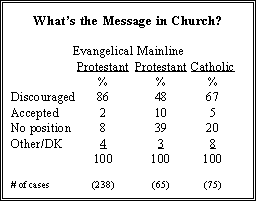
The vast majority of regular churchgoers who hear about homosexuality in church say the message is a negative rather than a neutral or positive one: overall, 76% say their clergy discourage homosexuality, while 4% say clergy favor acceptance of it; only 16% say their clergy take no position when they speak about the issue. Neutral or positive messages about homosexuality are much more common in mainline Protestant than in evangelical churches.
Is Homosexuality a Sin?
Most Americans (55%) believe that homosexual behavior is a sin, while 33% disagree. Strongly religious people are far more likely to see homosexual behavior as sinful than are the less religious. Nearly nine-in-ten (88%) highly committed white evangelicals say homosexual behavior is sinful, and 64% of committed white Catholics agree. Nearly three-quarters of black Protestants (74%) see homosexual conduct as sinful. But just 18% of secular respondents feel this way.
But most of those who view it as sinful do not think it is any more sinful than adultery; 44% overall (80% of those who think it is a sin) say homosexual behavior and adultery are equally sinful. Even among committed white evangelicals, fewer than one-in-ten (7%) rate homosexual behavior as more sinful than adultery.

No Agreement on Why Some Are Gay
Asked why some people are homosexual, 42% say it is “just the way that some people prefer to live,” compared with 30% who think homosexuality is something people are born with and 14% who believe it develops because of the way people are brought up. The view that homosexuality is innate is more prevalent now than in 1985, when 20% believed that homosexuality is something people are born with.
The public divides evenly 42% to 42% on the question of whether a gay or lesbian person’s sexual orientation can be changed or not; 16% have no opinion. Together, nearly one-quarter (24%) believe that people are born homosexual and that they cannot change their orientation. The same percentage (24%) believe that homosexuality is a way that some people prefer to live and that sexual orientation can be changed. The rest of the public holds some mix of these views.
In general, better-educated people are more likely than those with less education to see homosexuality as innate and unchangeable rather than a lifestyle choice, though even among college graduates there is considerable division of opinion. And politically, twice as many liberals as conservatives (46% versus 22%) say people are born homosexual.
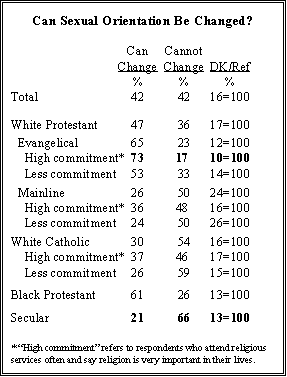
But the biggest differences on this question are seen among religious groups. More than half of highly committed white evangelicals (53%) and 60% of black Protestants say that homosexuality is just a way that some people prefer to live, and just 14% say it is something that people are born with. Similarly, 73% of committed white evangelicals think homosexuals can change their sexual orientation; 61% of black Protestants agree. By comparison, 54% of white Catholics and half of white mainline Protestants think homosexuals cannot change their orientation, a view shared by two-thirds (66%) of seculars.
Belief that homosexuality is immutable is strongly associated with positive opinions about gays and lesbians even more strongly than education, personal acquaintance with a homosexual, or general ideological beliefs. For example, about two-thirds of people who think homosexuality can be changed (68%) have an unfavorable opinion of gay men. By contrast, nearly six-in-ten (59%) of those who think homosexuality cannot be changed have a favorable opinion. This pattern holds even among groups of people who are similar in religious beliefs, partisan affiliation, and other factors.
Gays and Lesbians in Society
Most people do not think that greater societal acceptance of gays and lesbians would be a bad thing for the country, but neither do they believe it would be a good thing. A 42% plurality says that greater acceptance of gays would not make much difference, while 31% say it would be bad for the country; that is a modest increase from a Kaiser Family Foundation survey in 2000 (23%). Fewer than a quarter (23%) think greater acceptance of gays would be good for the country, down from 29% in 2000.
Nearly half of the public (48%) expresses the view that the entertainment media are including too many gay themes and characters these days compared with 40% who believe the media are providing the right amount of gay-themed content. These views are strongly related to religious tradition and practice, and to partisanship and ideology. Fully 72% of conservative Republicans think there are too many gay themes and characters in the media; only one-quarter of liberal Democrats agree.
Most Have a Gay Acquaintance or Relative
Six-in-ten Americans say they have a homosexual friend, colleague, or family member. Women are more likely than men to say they have a gay acquaintance or relative (67% vs. 53%). And more highly educated people than those with less education say they know or are related to someone who is gay: Nearly three-quarters of college graduates (73%) say they have a friend or relative who is gay compared with 52% of those with a high school education.
Democrats and Republicans differ very little on this question, but liberals (71%) are far more likely to have contact with homosexuals than are conservatives (54%). There are relatively small differences between religious groups in the likelihood of having a homosexual friend, family member, or colleague. But among seculars, 72% say they know someone who is homosexual.
When asked to name the first homosexual to come to mind, 74% responded, with about equal numbers naming either someone they knew a friend, relative, or associate or a public figure. About twice as many males as females were named, yet a female comedian and talk show host Ellen DeGeneres was by far the most commonly mentioned public figure.
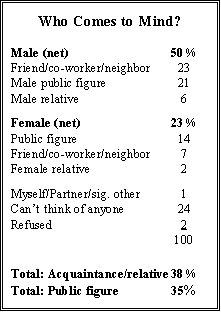
Half of those interviewed mentioned a male, including 23% who mentioned a friend, co-worker, or neighbor. About the same number 21% mentioned a male public figure or entertainer. Only 6% mentioned a male relative. By contrast, less than one-quarter (23%) mention ed a female, with more mentioning public figures (14%) than individuals the respondent actually knew (7% mentioned a friend, co-worker, or neighbor, and 2% mentioned a relative). One percent volunteered that they or their partner were the first homosexual that came to mind.
People who named someone they knew personally generally had more favorable attitudes toward gay men and lesbians than did people who mentioned public figures. People who could not name any homosexual had the most negative opinions.
Few Concerned By Being Around Gays
A large majority of those interviewed say it does not make them uncomfortable to be around homosexuals. Overall 76% say they are not uncomfortable; 20% say they are. Discomfort is greater among older respondents (29% of people age 65 and older), those living in rural areas (29%), conservative Republicans (30%), and highly committed white evangelicals (34% uncomfortable around gays and lesbians).
Perceptions and Stereotypes
Despite the fact that more Americans have negative than positive views of gays and lesbians, majorities do not see homosexuals as less happy than other people or less likely to form stable, long-term relationships. Nearly six-in-ten (57%) reject the idea that homosexuals are not as happy as heterosexuals, while a smaller majority (52%) believes gays are as likely as other people to have stable relationships.

People who have homosexual friends, family members, or colleagues are more likely to express opinions about these issues, and they generally view gays in a more positive light compared with those who do not have gay acquaintances and relatives.
For the most part, Americans do not subscribe to the stereotypical view that gay men have a better sense of style than heterosexual men. People who have gay friends or relatives are more likely than those who don’t to feel that gay men have a better sense of style, though opinion among this group is divided.
There is a gender gap in opinions on whether gay men have a better sense of style than heterosexual men. Four-in-ten women (41%) think that they do, compared with 26% of men. Differences over this perception are especially pronounced among younger people. Half of women under age 50 think that gay men have a superior sense of style compared with about a third of men under 50 (32%).


